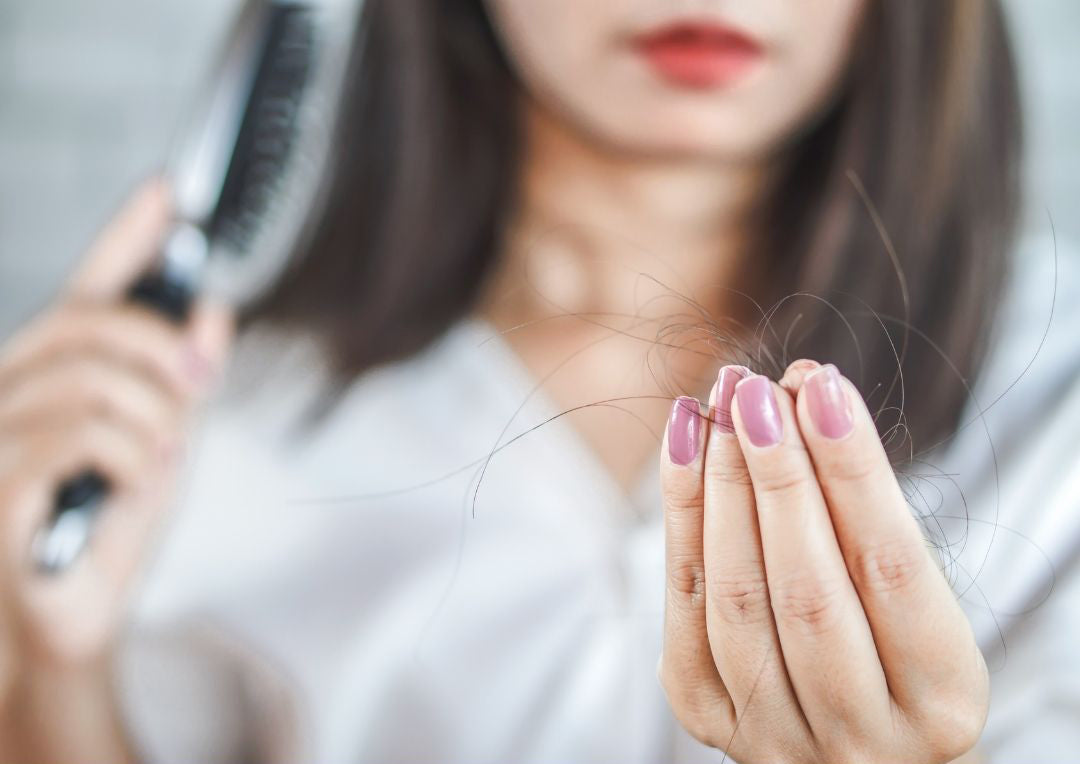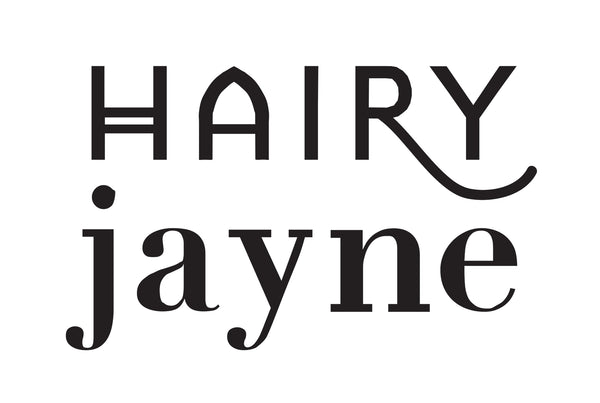
Why your hair is stressing you out: hair, hormones and menopause
Whether it seems superficial or not, our hair is very important to us. For some women it portrays their femininity and for others an edgy haircut makes a statement about their personal style. A bad hair day can be somewhat stressful.
And thinking that you're losing your hair can be very distressing, indeed. There is often a link between the health of our hair and hormones, and any added stress doesn't help.

Our relationship with our hair is a personal one which sometimes affects our wellbeing. It can bring about emotions ranging from pure frustration to utter glee. Unfortunately for some it sits up the frustration end of the scale more often than not.
Some days, no matter how hard you try and whichever hair care products you use, it just won’t do what you want it to do.
Hormonal changes might be affecting your hairs behaviour
As much as our hair affects our emotions, our health and wellbeing affects our hair. When I was working as a hairdresser, I sometimes saw clients who were baffled by sudden patches of missing hair. Some wondered why their hair was growing in two very different textures on their head. And pretty much every day there was talk of “new grey hairs” with a client.
All of these problems are usually directly connected to one or more of these things – stress, pregnancy or age.
Women’s hormones can massively affect their hair. Sex hormones, thyroid hormones, stress hormones – these all have an affect on follicles. They can cause hair to become greasier, change texture completely and, unfortunately, fall out.

What are hormones exactly?
Hormones are chemical messengers that use your bloodstream to travel throughout your body to your tissues and organs. They send messages about a number of body functions including metabolism, reproduction, growth and mood.
Women have 50 different types of hormones. The five most important hormones for normal body function are:
Insulin is a fat-storage hormone that regulates your metabolism and blood sugar levels.
Melatonin regulates your internal body clock and sleep quality.
Estrogen, the female sex hormone, affects women’s bodies, periods and moods.
Testosterone is produced in the ovaries (and in male testicles) and in women it is associated with sex drive, muscle, bone mass and fat cells.
Cortisol is the stress hormone and when triggered too often it leads to all sorts of health issues throughout the body.
If your body is producing too little or too much of a hormone, it can impact on your overall health and your hair, but not always. At various life stages, it is normal for woman's hormones to fluctuate.
It’s worth knowing how hormones can affect your hair so you can manage it better.

The main catalysts for hormonal changes and hormonal imbalances in women are puberty, pregnancy and menopause. Obviously every woman is different, so we all experience symptoms differently during these phases.
This is just a guide to what could be happening with your hair during these times.
How hair is affected during puberty
During puberty (pre-teens and teens) women experience a surge of estrogen. Estrogen can actually physically change the shape of the hair follicle. Straight hair grows out of a circular follicle so it grows straight. Curly hair grows out of a bean shaped one, which causes the hair to grow in a ‘bent’ way.
During puberty your follicles can actually change shape, meaning your hair could start changing texture. A lot of people are surprised that their hair is completely different to how it was as a child, but this is totally normal thanks to hormones.
Hormonal imbalances during puberty can cause the sebaceous glands to work overtime, too. The sebaceous glands create sebum which is our natural scalp oil. Too much sebum means greasy looking hair.
An increase in cortisol (the stress hormone) in puberty can lead to an excessively oily scalp and hair, too. On the other hand too much thyroid hormone, or hyperthyroidism, can cause very dry hair.
Hair care products for teens: lessen their stress with these Hairy Jayne hair care gifts for teenagers.
Hair and hormones during the menstrual cycle
Hormonal changes during your period can be responsible for bad hair days (as well as bad mood days). Sebum production influenced by hormones like testosterone and estrogen can mean greasy skin and hair.
In a study of sebum production on the skin, people with oily-type skin noticed an increase in sebum production during their premenstrual and menstrual period, with the lowest amount of sebum production during the second week of their cycle.
It’s worth bearing in mind that some hormonal contraceptives may also affect hair quality in the same way.

To combat greasy roots: soak it up and shake it out with Hairy Jayne Dry Shampoo.
Women’s hair during pregnancy
Some women notice thicker pregnancy hair. This is because the number of hairs shed daily is reduced. Pregnancy hormones influence the hair follicles to stay within their growth phase (anagen phase) longer than they normally would. So hairs that would naturally fall out during the 9 months, don’t.
They do eventually fall out which can feel like a lot of hair loss after pregnancy. It can happen postpartum or after stopping breastfeeding. The changes aren’t permanent and they don’t happen every pregnancy (even for the same woman).
Some women may experience hair loss during the pregnancy rather than afterwards if there is a hormonal imbalance where estrogen decreases.
Other changes that may occur are drier hair, oilier hair or even hair changing colour.
For pregnancy safe hair care products, avoid certain ingredients like parabens, synthetic fragrances, phthalates and methylisothiazolinone (MIT) and stick with sulfate free shampoos.
Certain essential oils can induce contractions so be sure to check which ones should be avoided when buying hair care fragranced with essential oils. And obviously always avoid any natural ingredient that you’ve had an allergic reaction to in the past.
Hairy Jayne shampoos are safe for pregnancy hair apart from our Herbal shampoo bar which we don't recommend for use during pregnancy as it has Clary Sage and Rosemary essential oils in. We do recommend our Shampoo Concentrate as there is a fragrance free option.

Our recommended shampoo for pregnancy hair: Shampoo Concentrate, fragrance free.
How hormones affect menopausal hair
Just like pregnancy, menopause and perimenopause affects each woman differently with differing symptoms. Along with hot flashes, mood changes, and sleep problems, most women with menopausal hair will lose the pigmentation in their hair (aka turning grey), with some experience thinning hair and many find their hair is more dry than it was before.
Hormonal fluctuations can sometimes be responsible for menopausal hair loss. Estrogen and progesterone usually keep the hair in the growing (anagen) phase, making it grow faster and stay on the head longer. But during menopause, estrogen and progesterone levels decline, slowing hair growth and allowing the hairs to fall out more quickly.
Also, in response to the loss of estrogen and progesterone the body produces more androgens. Androgens shrink hair follicles which make hair grow thinner, which can cause menopausal hair loss. Declining estrogen is the cause of the dryness.
Hormone replacement therapy (HRT) can improve hair growth if it is taken to treat the symptoms related to menopause. Not all women choose to go on HRT, and there are other ways to boost your hair’s health during menopause that don’t require medication.
A change of hair style can mean healthier looking hair
A shorter haircut can make finer hair less obvious if you're worried about it thinning. And embracing the grey is the best way to reduce further damage caused by colouring your hair.
Look for moisturising hair care products for dry hair. White hair tends to be naturally drier and frizzier than pigmented hair. For thicker hair types, use a leave-in Treatment Conditioner and follow up with a naturally nourishing hair oil to seal in moisture and tame any frizziness.

Take good care of your scalp for stronger hair
Use a sulphate free shampoo with moisturising ingredients, like our Shampoo Bar, as the scalp naturally produces less oil. Massaging your scalp with a Scalp Massager as you shampoo will increase blood flow and oil production. A healthy scalp and follicles is a good environment for optimal hair growth.
Hairy Jayne Pre-shampoo Treatment Oil used weekly will keep your scalp nourished in the same way a facial oil helps your skin.
Add more protein and vitamins into your diet
Keratin, the building block of your hair, is a protein and it is affected by how much protein you eat. Keratin is made up from amino acids, which your body gets from protein rich foods such as beans, kale and asparagus.
A lot of vitamins can help too and if you’re considering taking supplements it’s worth consulting with a doctor or nutritionist for the best advice.

A great place to start for Hairy Jayne beginners is our Discovery Set. Try out our two shampoos and four conditioners, our pre-shampoo treatment oil and dry shampoo in your hair before committing to full sizes.
For more hair care advice and tips for healthy hair, sign up to our emails or follow us on Instagram or Pinterest.
